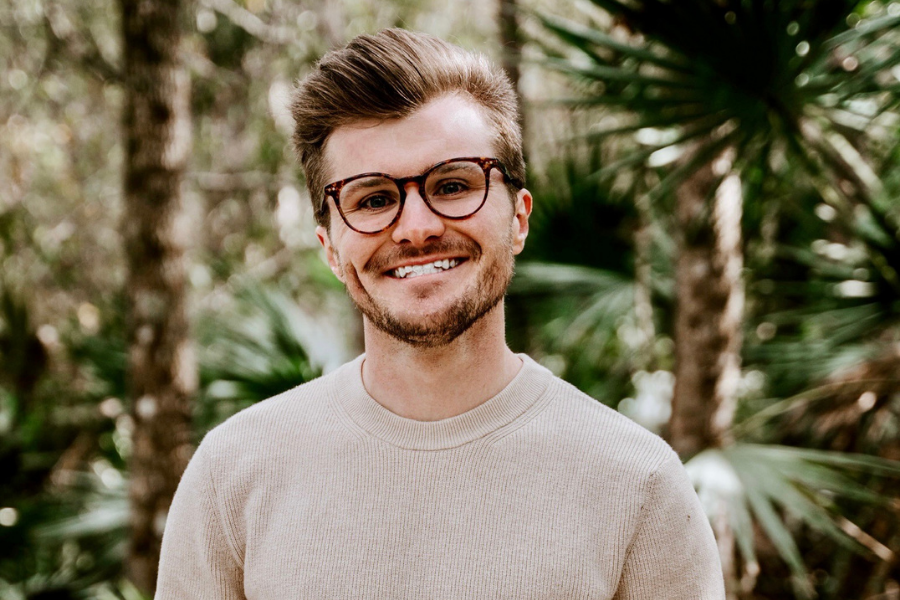James Waters

"New knowledge makes the future possible"
College: Arts and Sciences
Degree Program: Religion
Degree: Doctoral
Why FSU?
In 2018, I was accepted to a top seminary to study in their doctoral program. While the seminary's name and reputation carried significant weight, I decided to attend the doctoral program in the Department of Religion for its strengths in Comparative Religious Ethics and its broader approach to studying religion. Moreover, the faculty were warm and welcoming. FSU felt like home even during my initial visit.
Motivation to pursue a graduate degree
I was a poor student in high school; I doubt I even finished with a 3.0 GPA, and my ACT score was 18. School did not interest me, and standardized tests grated against my seventeen-year-old sensibilities. However, I somehow made it into college, and during my sophomore year, I took an Introduction to Philosophy course. That course changed the way I thought about school and academics. I was always interested in the big questions: "how do we live the best life?"; "why is there something rather than nothing?"; "is there a god, and, if yes, does god care about any of us?" These are queries that we will never fully resolve, of course. But my philosophy teacher encouraged me to ask them despite the ineffability of their answers. He showed me that true scholarship is not about solving problems but collaboratively uncovering new questions and interrogating them as best we can. Honestly, it was this experience that led me to pursue the life of a scholar. It was also during this time that I discovered I was intellectually gifted.
Importance and/or impact of research and work
My dissertation analyzes historical cases where American Indians combined elements of Christianity with Animist worldviews to adapt to shifting political landscapes. Such instances, I argue, are essential blueprints for present-day traditions seeking to reconfigure, hybridize, or “mix” moral vocabularies to address the unprecedented problems of climate change. My work addresses both concerns of environmental ethics and the decolonization of indigenous persons and lands, not just as a matter of ethicality but of effectiveness. I study this mainly because until our solutions to environmental challenges break free of settler epistemologies, we remain beholden to a view of nature that sees it as a collection of resources to be conquered, dominated, and sold. Engaging both issues as one, my research promotes anti-ethnocentric religious ecologies and ethics at the scholarly level while remaining intelligible to the largest religious group in the U.S., i.e., Christians—a group that deeply needs new ecological frameworks. Following the lead of American Indian Christians, it attempts to offer Christians a new environmental framework that mixes animist and Christian worldviews. Some scholars have called this framework “Christian animism.” Highlighting American Indians’ tenacity and cultural-religious flexibility, I show how their historical practice of hybridizing religious worldviews has led to the present-day practice of using Christian language to make their messaging around environmental issues more intelligible to a broader [whiter] public. This work is essential, for if the global community wishes to survive the greatest common crises humanity has yet to face in the form of climate change, it must embrace a co-equal religious-cultural flexibility around issues of environment. My work hopes to produce subsequent scholarship and public discussions which might prime participants and readers for such a disposition.
Career aspirations
I aspire to secure a tenure track position teaching religious studies and continuing my research on American Indian religions, ecology, and religious ethics. While I love research, I am equally passionate about teaching and look forward to continuing my work with students.
Advice for anyone considering graduate school
Abandon the idea of the self-made, tortured intellectual. It's toxic and entirely false. Most successful scholars are generous and willing to help you along the way. Moreover, all scholarship is, at the end of the day, collaborative. You must learn an academic discourse before adding knowledge to your field, and no singular person has the bandwidth to have an entirely comprehensive grasp of any given discipline.
Accomplishments during graduate career
I'm proud of my recently published paper: “American Indian Traditions and Religious Ethics: A Revealing Lacuna.” Journal of Religious Ethics, Early View (May): 1–34. I think it can potentially help change some things in my field.
I have also received a couple of awards: American Academy of Religion Best Graduate Student Paper Award; Outstanding Teaching Assistant Award, FSU PIE; Editorial Assistant Fellowship, Religious Ethics Inc., Journal of Religious Ethics.
